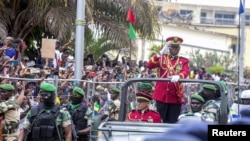General Brice Oligui Nguema took the oath of office as Gabon's interim president at the presidential palace in the capital, Libreville, amid a cheering crowd of supporters and a military display.
But experts say the ceremony marks the beginning of an uncertain future in the Central African nation.
Oligui, who promised to hold free and transparent elections to return the country to civilian rule, did not say when he'll cede power. He says a new constitution must first be adopted by referendum.
Godbless Otubure is the founder of the nonprofit pro-democracy group, Ready To Lead Africa.
"The military knows that they do not have the capacity to run a democratically run country, so when he's not giving a timeline, it's because he might also not be free from the curse of hanging on to power," Otubure said. "I do not believe that he has the best interest of the country at heart if he is not making a commitment to when he will be transitioning back to democratic rule."
It is questionable whether Gabon had democratic rule in the past. Omar Bongo and his son Ali ruled the country for 56 years.
Still, on Friday, Gabon's military leaders said they were not in a hurry to return to democracy and repeat past mistakes.
Last week, Oligui and his men overthrew Ali Bongo shortly after he was declared the winner of the disputed presidential polls. The military cited corruption and serious institutional, political and economic problems as grounds for the overthrow.
It was the eighth coup d'état in West and Central Africa in three years and comes one month after the ousting of Niger's president, Mohammed Bazoum.
The coup has drawn global criticisms, including from the United Nations and the African Union, which suspended Gabon and threatened to impose sanctions if coup leaders fail to restore constitutional order.
Chris Kwaja, a member of the United Nations Working Group on the use of mercenaries, says sanctions would make coup leaders more compliant.
"Even for Niger, the three years they agreed on was based on pressures from ECOWAS [Economic Community of West African States] and other actors," Kwaja said. "At the initial stage, there was no clear-cut timeline, and what we see in Gabon is also taking that shape. When international pressure comes in, they will now unveil a timetable. And this has become a typical feature of military rule —they only act on the basics of pressure."
Experts say the growing trend for military takeovers is triggered by poor governance in Africa.
Paul James is the elections program officer at the Youth Initiative for Advocacy, Growth and Advancement, or YIAGA Africa.
"When governments are removed forcefully, and you begin to see citizens jubilate, what that points to me is that quality of leadership is declining. And that's why we're having what we have at the moment," James said.
Otubure, of Ready To Lead Africa, goes further, saying, "What we’re seeing is the failure of the democratic experiment in Africa."




